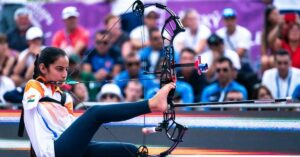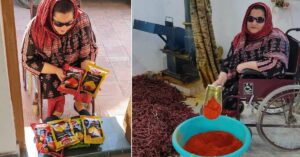After Losing Vision, IITian Develops Tool to Help Visually Impaired Use Popular Apps
The 53-year-old Pramit Bhargava runs Visioapps, a Gurugram-based startup, which developed the Louie Voice Control app, a “virtual friend” for the visually impaired.
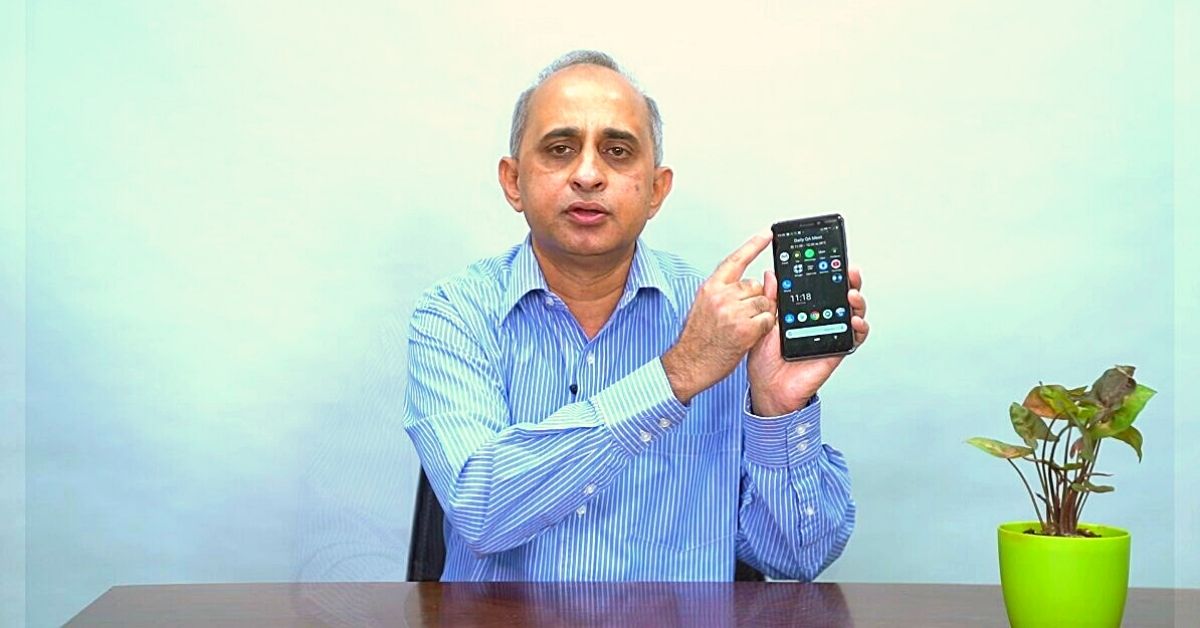
Nearly 22 years ago, Pramit Bhargava was prescribed a drug for a certain rheumatic disorder while working at Hindustan Unilever, India’s largest Fast Moving Consumer Goods (FMCG) company.
Upon consuming this drug, however, his retina was damaged, and Pramit suffered a drastic loss of vision overnight. Making matters worse, doctors were unable to come up with a proper treatment plan or prognosis of how this extremely rare condition, called ‘hydroxychloroquine retinal toxicity’, would progress.
For over a decade following this diagnosis, he managed his responsibilities at different offices working for top-notch multinational companies like Motorola and Quest Diagnostics.
But as the years went by, Pramit, a graduate of computer science engineering from IIT-BHU and an MBA from IIM-Bangalore, suffered a progressive loss of vision. Eight to nine years ago, he reached a point where he couldn’t read anything on a page irrespective of the font size.
Today, the 53-year-old Pramit Bhargava runs Visioapps, a Gurugram-based startup, which has developed the Louie Voice Control app, a “virtual friend” for the visually impaired. The app allows them to send a text on WhatsApp or book a cab on Uber using voice commands.
In other words, by just using voice commands, a visually impaired person can more or less do everything on popular apps and utilise various features on their phones. Louie Voice Control plays a significant role in assisting the visually impaired to access a world where most now engage in online activity through their smartphones.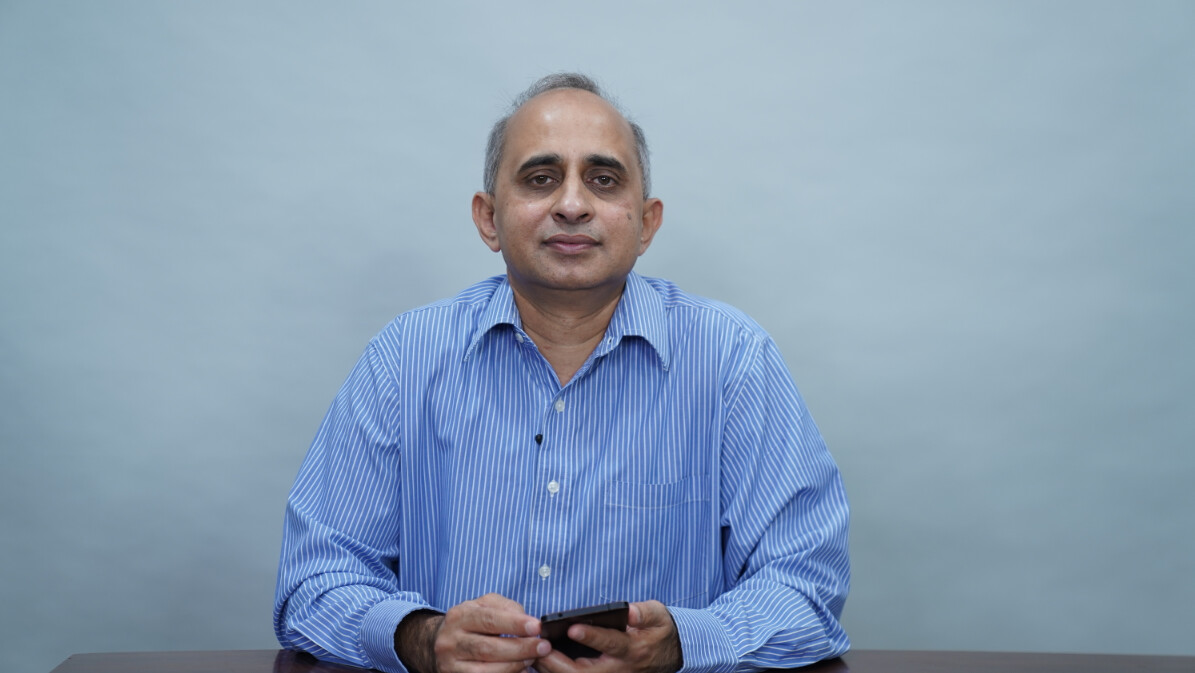
Receding confidence brought back to life by serendipity
“When my progressive loss of vision reached its zenith, I suffered a shattering loss of confidence. I began asking myself whether I could perform basic daily tasks like picking up a call and knowing who’s on the other side. There were questions about whether I would be able to prepare Excel sheets or deliver a PowerPoint presentation. These possible shortcomings were detrimental to my work, which revolved around managing major businesses. I had to quit my job. For about two or three years till 2015. I was going through a horrible phase of deep disappointment and loss of confidence, while being unable to do any sort of productive work, ” Pramit recalls.
Fortunately, he had friends who helped him out of this personal rut.
By 2016, he began consulting work for different companies, but the only thing available for the visually impaired was a screen reader that was fairly basic and difficult to use.
However, a series of chance events would change his life forever. About four years back, he visited the office of a Delhi-based global venture capital firm to visit their managing director (MD). Pramit was looking for consulting assignments. Upon finding out about his story, the MD offered total assistance in building an app for the visually impaired. The MD of this venture capital wishes to remain anonymous.
Following this meeting, there was another meeting with a friend, who invited him to his office in Delhi. After the meeting, his friend offered to book an Uber cab for him.
While booking Pramit’s ride, his friend took him through each step from destination address, pick up point to ride type and payment option. After confirming the ride, his friend called the driver, while Pramit spoke on the phone to re-confirm details. All along, Pramit was in control of the process, even though his friend dutifully assisted him in making these decisions.
“On my way back home in an Uber, a thought suddenly emerged in my mind: What if I can build a virtual friend who can assist me just like my physical friend did? I envisioned a virtual friend on screen, who could facilitate the same kind of voice interaction I shared with my friend. A visually impaired person, through these voice commands, should be able to use the app like a sighted person would,” Pramit says.
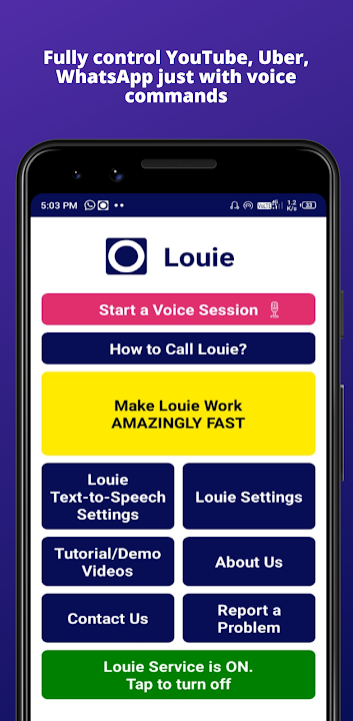
‘Brother Louie-Modern Talking’
Pramit started the company about two and a half years ago, although he knew the process of developing the Louie Voice Control app was going to be a very technologically challenging endeavour. Nobody in the world was trying to develop an app for the visually impaired the way his team of 14 employees, including 5 android developers, were doing.
Before establishing this startup, however, Pramit worked with two firms—one in Pune and another in Gurugram—to ascertain the technical feasibility of such an app for nine months.
Visioapps was started in June 2018, but by October 2018, they had not written a single line of code because the technology was very complex.
“We were just trying to ascertain the basic building blocks. Once we managed to achieve this and figure out the screen reading technology, we were ready to go. For our android developers who are sighted, I sometimes used blindfolds to help them develop an app that visually impaired people could really use. About a year and a half ago, when the app was shaping up well, we decided to put up a beta version on Google Play Store and let users test it. Currently, we have users from about 70 countries, although half of them are from India. User feedback has been driving the development of this app. Everything is based on feedback, with our developers trying to understand their pain points,” says Pramit.
It has only been about a month since Pramit and his team launched the app across the world, on November 1.
In the past month, they have conducted many webinars and live demos of the app for various associations and institutions working with the visually impaired. They have helped spread the word about Louie and even set up exclusive WhatsApp groups whereby users can constantly send their feedback.
Louie ain’t no Siri or Alexa
Pramit is at pains to explain how vastly Louie is different from other voice assistants like Alexa and Siri. With Louie, a visually impaired person can do everything on popular apps such as Uber, WhatsApp or YouTube, and use various features on phones like managing contacts and calling people, just by using voice commands.
Using Uber, let’s explain three reasons why Louie is different from Alexa or Siri.
1) Whichever app Louie voice enables, you can do everything within it with voice commands, while Alexa, Siri or Google Assistant perform very superficial tasks.
In the case of Uber, one of them will just open the app and the other can insert the destination details while everything else has to be done manually. Meanwhile, Louie will ask where you want to go, give you options, select your destination, list ride types in the order of rising prices, confirm the ride with car number, how much time it will take, call the driver or even cancel the ride. Once the ride starts, a visually person can share their trip with family members or friends, change destinations, select multiple stops, etc.
2) For Louie to do all these tasks, continuous voice interaction with the user is a must. It’s a two way continuous voice interaction between the user and Louie. None of the other voice assistance systems do that for users. Communication is more or less a one way street with systems like Alexa or Siri, where users just issue commands.
3) Louie picks up on where the user has left on an app, while none of the other voice assistants will do it. Take the example of Uber.
“After booking a ride, Louie informs me that the ride is 10 minutes away. So, what I will do is turn Louie off because there is nothing to talk about but wait for my ride. But say if I want to check the status of the ride after seven minutes, all I have to do is shake my phone twice. Louie switches on, immediately recognises the Uber screen and starts telling me that the driver is three minutes away and asks whether I want to call or send a text message to the driver,” says Pramit.
Looking Ahead
There are lots of apps available in the visually impaired space. It’s also important to recognise different facets of a visually impaired persons’ life.
Every app for them is made with a certain objective in mind. Most apps that have come up in the past two years are of the OCR (Optical Character Recognition) variety that can read a document for users. Similarly, there are image recognition apps as well.
But is there an app which helps users get through the day quite like Louie? At present, they are working on enhancing two features—enabling users to do a Google search, browse, navigate the web, open pages and read documents out and receiving and disconnecting calls. They are trying to make it easier for users to disconnect and receive a call. They’re even attempting to develop voice enable apps for ordering foods.
At present, this app works only on Android phones. In the second half of next year, they will take a crack at the iPhone as well. Moreover, work is about to begin on developing Louie in more regional and global languages like Hindi and Spanish.
“At present, we have about 9,000 downloads, and the word is spreading. There are many improvements to be made, but in general the feedback I receive suggests there is a genuine need for Louie. For now, the app is free. It will remain so until we hit that point where the app can fulfill a minimum set of consumer needs through voice enabling more popular apps and other phone features. Another key concern is affordability. Everyone around the world should be able to afford it, but self-sustainability is very important since we don’t want to remain at the mercy of our investors in India and the United States,” he says.
(Edited by Divya Sethu)
Like this story? Or have something to share? Write to us: [email protected], or connect with us on Facebook and Twitter.
This story made me
- 97
- 121
- 89
- 167
Tell Us More
We bring stories straight from the heart of India, to inspire millions and create a wave of impact. Our positive movement is growing bigger everyday, and we would love for you to join it.
Please contribute whatever you can, every little penny helps our team in bringing you more stories that support dreams and spread hope.






